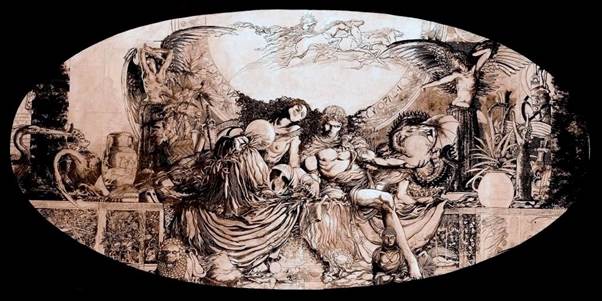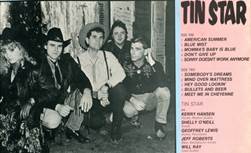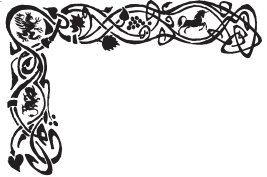What fact does is blind us to everything that is not fact; the higher truths of symmetry and proportionate space, images that are symbolic of meaning and power (Yggdrasil CH5). We become slaves, somewhat resembling the Nazi slogan, “Work Makes You Free”. What we are told is the opposite of the truth, that we are born of the dream of the universe, that human physique is holy, human fertility is God-given.
Without meaning (see figures in a landscape Weird 11) and power (ontology) we become like the biggest fact of all, DNA, which becomes more fictional and cybergenome. Figures in a landscape; the human fertility symbol (power and iconic nature); proportion and rhythm of bounty. We must break free of false comfort and into the protective comfort of physique and psyche, the guardian spirits of natural places. What CL Moore calls the “ambiguous symmetry” of the universe (Pictorial 8), an irresolvable space that is a duality of sun and moon, earth and sky, male and female, predator and prey. Protect us, the old gods, from infidels of arcane science who search for something that can never exist: the unified theory, resolved space; call it “Relativity 3”.
An Apollonian theory of the universe - Relativity 1(space-time) - only has bizarre facts, and the more “they” probe the more bizarrely logical the facts (CH3 “the false Apollo”). The things missing are meaning and power, which you could liken to the moon, our closest cosmic companion, weaving her trace round our paltry planet, her uncanny effects on the sun inspiring meaning and power and giving us a sense of eternal perspective on cosmic events. Relativity 2 (electromagnetism) is Apollo. Relativity 3, the unification of those two opposites, would mean the death of reality.
With their calculations, they seek to get rid of all disparities, symbolised by the cathedral of CERN, a worldview of sameness and psychic weakness, an infirmity of spirit, a flatland of the mind. “They” grow confident as their precise machines produce startling results. “More precision!” they cry (from their prison of precision), Apollo turning a blind eye to Artemis. Looking into the eye of the sun and seeing spots. Over to Prof Brian Cox

Q from the floor: “how confident am I?” Let’s just say there’s no equation for doubt
We are in the fake universe of sameness where fact becomes fiction and government is the enemy of milieu, of collective memories of the Old West. The wormdollar; the cy-born; welcome to your future, to the “facts” of cybergenome in a universe of perfect order (Korvac Weird 8). In this nothingness, the startling facts “they” find inspire a sort of psychotic confidence. There is no freedom without doubt.
The higher truths, the symmetries of myths, cannot be fooled. The universe has “ambiguous symmetry”, and that is what they illustrate. Myths speak of closeness, of incestuousness – the love of Apollo for his “sister” Daphne (or Artemis-Daphne). The myths of procreation, of harvest fertility, of the gay god of the vine, Dionysus.

BWS, Artemis and Apollo, study
Decadence assaults the senses in BWS’s heroic image. Superb Apollo darts like cosmic lightning; his sister broods wilfully in moody disdain. Their coexistence is the personification of “thingness”. As I keep saying, we live in the age of nothingness or talking-heads, not meaning and power!
The smug satisfaction of Apollonian alchemists can’t survive the baleful light of a harvest moon. Certainties dissipate as we taste the wine of gloomy exhilaration; we are living in the moment, in the commune and we are our own masters.

“This might be someone’s dream, But it ain’t mine”
Government, order, the light of certainty can’t touch us. We live as the Cossacks in Gogol’s Taras Bulba
Andrii gave himself up wholly to the enchanting music of blades and bullets. He knew not what it was to consider or calculate, or to measure his own as against the enemy’s strength. He gazed on battle with mad delight and intoxication.. (The Greatest Masterpieces of Russian Literature page 46, Dent)
Taras Bulba is almost Howard’s ideal society with no real organization, just leaders and collective unconscious on the steppes. The piratical Cossacks have to be assumed to be a heavy influence on both Howard’s Cossack adventures and on Conan’s Barachan odyssey with Belit. Gogol’s Cossacks fight for Christendom (Orthodox Russian or Greek Church) which is probably the main difference.
In the story, Andrii flees his comrades to the arms of a beautiful maiden of the enemy, led there by a Tatar slave
When he turned to look at the Tatar woman, she stood before him, muffled in her mantle, like a dark granite statue, and the gleam of the distant dawn lighted up her eyes, dull as those of a corpse. (page 55)
The baleful uncertainty of the enterprise takes place on the stage of night
..glancing back, he saw that the steep slope rose behind him higher than a man. On the summit appeared a few blades of steppe-grass; and behind them, in the sky, hung the moon, like a golden sickle. The breeze rising on the steppe warned him that the dawn was not far off. (page 55)
The fairy tale romance glows with an eternal fire; the gloom the soul is heir to
Astounded, she gazed in his eyes for a space, like a beautiful statue, and then suddenly burst out sobbing; and with the wonderful feminine impetuosity which only grand-souled, uncalculating women, created for fine impulses of the heart, are capable of, threw herself upon his neck, encircling it with her wondrous snowy arms, and wept. (page 68)
Man is a Fortunate being, and these two are real in an unreal world (Byron Tales of Faith 8). Though they may die their dream lives on. The baleful stage teaches us that the only certainties are passion, and the desire to do what one sees as one’s duty. On the baleful stage of Taras Bulba, and of Solomon Kane, life’s travails are gloomy but filled with lustful exhilaration that is strong mead to the soul. It is the stuff of ageless saga and fairy tale. The spirit ofWeird Tales .
We live in a concrete age where the meaning of power is but a whisper in the wind. You will find them under the light of a harvest moon in a smalltown somewhere in Kansas.
Home







